This article includes a list of general references, but it lacks sufficient corresponding inline citations .(January 2022) |

Imbi Paju (born 3 June 1959) is an Estonian-born journalist, writer and filmmaker resident in Finland. [1]
This article includes a list of general references, but it lacks sufficient corresponding inline citations .(January 2022) |

Imbi Paju (born 3 June 1959) is an Estonian-born journalist, writer and filmmaker resident in Finland. [1]
Paju was born in Jõgevamaa, but has been operating in Finland as a correspondent of the Estonian newspapers Eesti Päevaleht and Postimees . Before Estonia's re-independence, she worked in Tartu's Vanemuine Theatre opera chorus. 1998-2005 she worked Finnish TV-station Nelonen, specialist in the Baltics
Film director, author and journalist Imbi Paju has won international attention with Memories Denied (2005), her documentary film and book of the same name. Both the film and the book deal with her mother’s experiences in a Soviet slave labor camp, the occupation of Estonia by the Soviet Union and Nazi Germany, and the attempts by totalitarian regimes to destroy human memory. Paju has been praised for her ability to visually portray traumas of the past, something that is hard to do with words alone. Memories Denied shows us how the tragedy of an individual family repeated over and over gradually becomes a national tragedy, a part of the collective but interrupted European narrative, silenced by occupations and the cold reality of politics. Memories Denied has been translated and published in Estonian, Finnish, Swedish, English, Russian, German. In 2007 it was selected for use in the Swedish school program Living History, which deals with both Nazi and Communist crimes. In 2008 the film Memories Denied was translated into Russian, as was the book in 2009. Since then Paju has travelled around Estonia presenting the book to Russian-speaking communities and has had the pleasure to meet with students, teachers, community groups, and others.
In 2009, Paju and Finnish writer Sofi Oksanen published a collection of essays entitled Fear Was Behind Everything. How Estonia Lost its History and How to Get it Back (WSOY) which further develops the same themes.
The year 2009 saw the premiere of her new documentary film Sisters across the Gulf of Finland, which deals with terror, totalitarianism and humanity in the next step on the search for the truth. In 2011/2012 She published psychological-historical best-sellers nonfiction Sisters Across the Gulf of Finland. Watching the Pain of Others (publisher Like 2011/Finland;2012 Hea Lugu/Estonia;2014 Atlantis/Sweden). It is a story about how Estonian, Finnish and other Scandinavian women around Baltic Sea worked together to prevent the onset of crisis and war their own unique actions. Sisters Across The Gulf of Finland. Watching the Pain of Others reveals the pains left to us as an inheritance by the past. Imbi Paju examines the way in which we look at each other, ourselves and our history. The stories of these women refresh our memories and call to mind the pages of our story hidden in the silence of history.
Imbi Paju has lectured and taken part in numerous seminars and deliberations about the crimes of communism and historical denial. Discussions inspired by her book and film in Estonia, Finland, Germany, Norway, Sweden, Denmark, Taiwan, Ireland, Greece, Israel and the United States have helped open a dialogue in Europe as well as North America. This discussion continues with increasing clarity and urgency.

The Baltic Sea is an arm of the Atlantic Ocean that is enclosed by Denmark, Estonia, Finland, Germany, Latvia, Lithuania, Poland, Russia, Sweden and the North and Central European Plain.

The Gulf of Finland is the easternmost arm of the Baltic Sea. It extends between Finland to the north and Estonia to the south, to Saint Petersburg in Russia to the east, where the river Neva drains into it. Other major cities around the gulf include Helsinki and Tallinn. The eastern parts of the Gulf of Finland belong to Russia, and some of Russia's most important oil harbors are located farthest in, near Saint Petersburg. As the seaway to Saint Petersburg, the Gulf of Finland has been and continues to be of considerable strategic importance to Russia. Some of the environmental problems affecting the Baltic Sea are at their most pronounced in the shallow gulf. Proposals for a tunnel through the gulf have been made.

Haapsalu is a seaside resort town located on the west coast of Estonia. It is the administrative centre of Lääne County, and on 1 January 2020 it had a population of 9,375.
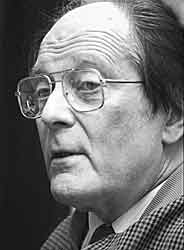
Jaan Kross was an Estonian writer. He won the 1995 International Nonino Prize in Italy.
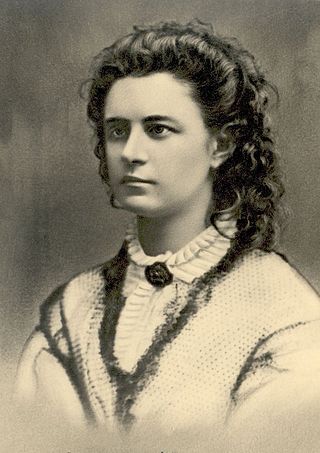
Lydia Emilie Florentine Jannsen, known by her pen name Lydia Koidula, was an Estonian poet. Her sobriquet means 'Lydia of the Dawn' in Estonian. It was given to her by the writer Carl Robert Jakobson. She is also frequently referred to as Koidulaulik – 'Singer of the Dawn'.

Konstantin Päts was an Estonian statesman and the country's president in 1938–1940. Päts was one of the most influential politicians of the independent democratic Republic of Estonia, and during the two decades prior to World War II he also served five times as the country's prime minister. After the 16–17 June 1940 Soviet invasion and occupation of Estonia, President Päts remained formally in office for over a month, until he was forced to resign, imprisoned by the new Stalinist regime, and deported to the USSR, where he died in 1956.

The Battle of Narva was a World War II military campaign, lasting from 2 February to 10 August 1944, in which the German Army Detachment "Narwa" and the Soviet Leningrad Front fought for possession of the strategically important Narva Isthmus.
Postimees is an Estonian daily newspaper established on 5 June 1857, by Johann Voldemar Jannsen. In 1891, it became the first daily newspaper in Estonia. Its current editor-in-chief is Priit Hõbemägi. The paper has approximately 250 employees.
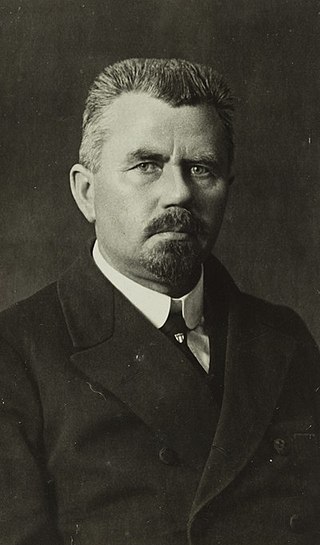
Johan Pitka, VR I/1, was an Estonian entrepreneur, sea captain and a rear admiral (1919). He was the Commander of the Estonian Navy in the Estonian War of Independence.
Karl Ristikivi was an Estonian writer. He is among the best Estonian writers for his historical novels.

Marina Kaljurand is an Estonian politician and Member of the European Parliament. Kaljurand served as Minister of Foreign Affairs in Taavi Rõivas' second cabinet as an independent. Earlier, she served as the Ambassador of Estonia to the United States, Russia, Mexico, Canada, Kazakhstan, and Israel.
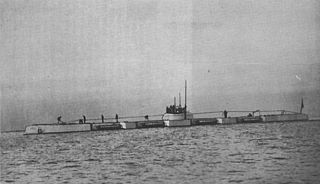
The Bars class were a group of submarines built for the Imperial Russian Navy during World War I. A total of 24 boats were built between 1914 and 1917. A number of them saw action during the First World War, and three were lost in the conflict. The surviving boats were taken over by the Soviets after the Bolshevik Revolution and a number of them remained in service until the 1930s.
Since 1991 Estonia has changed from being a former Soviet republic to a member of the European Union and the European Monetary Union, making a rapid transformation in several fields, including the mass media, which is a vibrant and competitive sector. For many years Estonia has been among the top ten in Reporters Without Borders’ (RSF) Press Freedom Index. In 2017 it was ranked 12th out of 180 countries by RSF while Freedom House assigned Estonia’s press freedom a score of 16/100. A cross-media landscape that embraces traditional media as well as the Internet and digital media characterises the contemporary media system in Estonia.

The Soviet Story is a 2008 documentary film about Soviet Communism and Soviet–German relations before 1941 and after, written and directed by Edvīns Šnore, and sponsored by the far-right Union for Europe of the Nations group in the European Parliament. The film features interviews with Western and Russian historians such as Norman Davies and Boris Vadimovich Sokolov, the Russian writer Viktor Suvorov, the Soviet dissident Vladimir Bukovsky, members of the European Parliament, and participants and survivors of the Soviet terror. Sokolov later emphasized that he simply offered expert advice and told Šnore that some of the things he claimed were based on obvious falsifications.

The following is an alphabetical list of articles related to the Republic of Estonia.
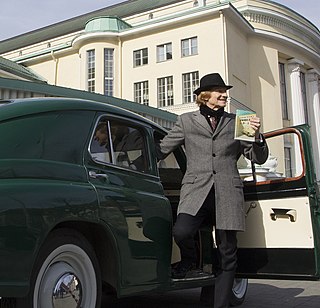
Ilmar Taska is an Estonian filmmaker and writer, who was writer and producer for 20th Century Fox movie Back in the USSR (1992) and producer for Candles in the Dark directed by Maximilian Schell. Ilmar Taska's 2016 novel Pobeda 1946 has been translated into many languages and was nominated for the Jarl Hellemann Translation Prize in Finland as best translated book of the year.

The Finnish Anti-Fascist Committee, also known by its Finnish abbreviation SAFKA, is a radical political organisation operating in Finland, founded in November 2008, but never registered. According to the Chairperson Johan Bäckman the committee has twenty activists and about a hundred supporters.

The Estonian Soviet Socialist Republic, also known as the Estonian SSR, Soviet Estonia, or simply Estonia, was a union republic and an ethnically based administrative subdivision of the former Soviet Union (USSR) covering the occupied and annexed territory of Estonia in 1940–1941 and 1944–1991. The Estonian SSR was nominally established to replace the until then independent Republic of Estonia on 21 July 1940, a month after the 16–17 June 1940 Soviet military invasion and occupation of the country during World War II. After the installation of a Stalinist government which, backed by the occupying Soviet Red Army, declared Estonia a Soviet constituency, the Estonian SSR was subsequently incorporated into the Soviet Union as a "union republic" on 6 August 1940. Estonia was occupied by Nazi Germany in 1941, and administered as a part of Reichskommissariat Ostland until it was reconquered by the USSR in 1944.

Estonia, formally the Republic of Estonia, is a country by the Baltic Sea in Northern Europe. It is bordered to the north by the Gulf of Finland across from Finland, to the west by the sea across from Sweden, to the south by Latvia, and to the east by Lake Peipus and Russia. The territory of Estonia consists of the mainland, the larger islands of Saaremaa and Hiiumaa, and over 2,200 other islands and islets on the eastern coast of the Baltic Sea, covering a total area of 45,339 square kilometres (17,505 sq mi). The capital city Tallinn and Tartu are the two largest urban areas of the country. The Estonian language is the autochthonous and the official language of Estonia; it is the first language of the majority of its population, as well as the world's second most spoken Finnic language.
Estonians in Finland or Finnish Estonians are people with an ethnic Estonian background residing in Finland. In 2017, there were 52,424 Estonian immigrants in Finland, according to the UN. Estonians are Finland's second largest immigrant group, after Russians.